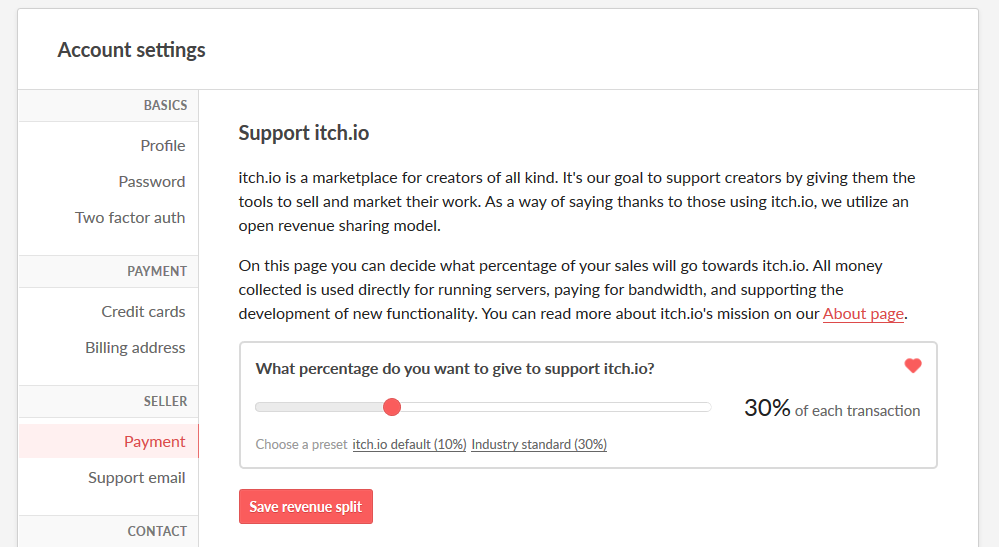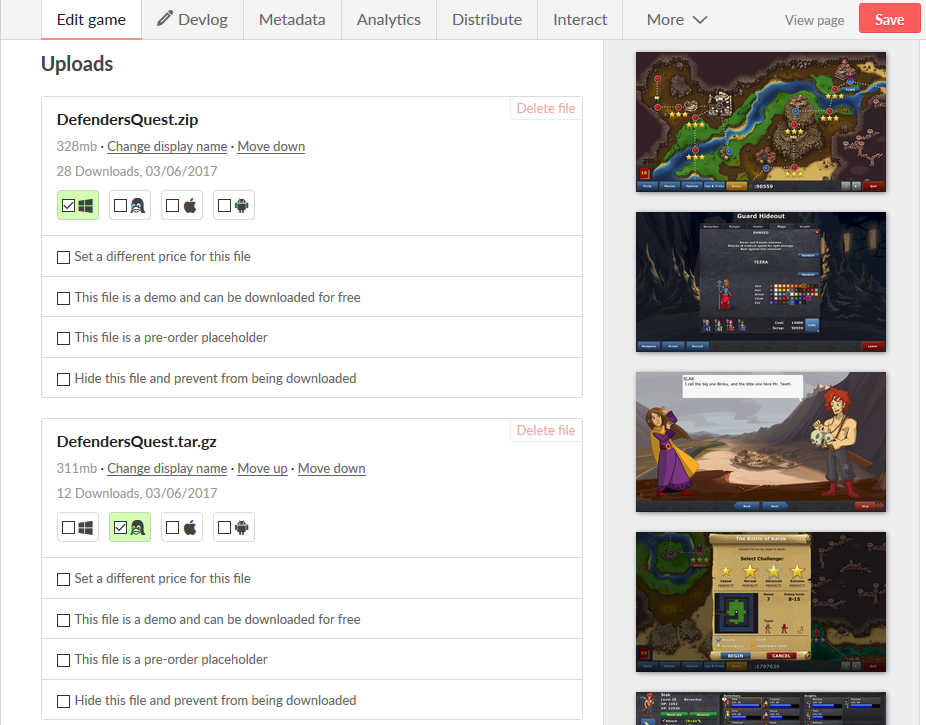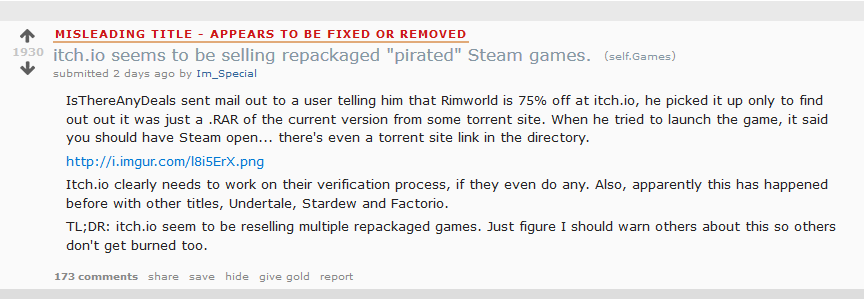Shops / developers / buyers / publishers

All major game stores (Steam, GOG, Origin, Uplay, itch, etc.) serve different groups of people simultaneously. Many of these groups have opposing interests. Simply put, they can be divided into:
- Buyers
- Developers
- Publishers
- Shopping platforms themselves
Often heard complaints to different stores (usually on Steam). But it is not always obvious who complains, what are his interests, and how they affect the interests of other groups. If you are reading this article, then, most likely, the interests of developers, customers, or both of these groups are closer to you. However, all groups have their own interests, and they often conflict.
Conflicts and interests
Some conflicts are obvious - a stereotypical greedy businessman who uses all his opportunities to defend his own interests and the interests of partners to the detriment of customers, and the developers who work for him, who suffer from poor working conditions. A sad example for our industry.
')
Other examples are not so obvious. Most of us are in a consumer culture, in which the slogan “the buyer is always right” seems like an indispensable ideal. Of course, it is worth striving to ensure that entrepreneurs are honest and fair with customers. But there are limits to everything and there are always compromises: for example, the extreme degree of “customer friendliness” is free distribution of goods. Obviously, in the absence of compromises, the store will not be able to defend its own interests (“we went bankrupt, hurray!”), Moreover, it burns bridges with suppliers dependent on it.
Of course, you can be customer-friendly and hostile to developers, giving preference to one side and thus gaining benefits. Outside of the world of games, Amazon.com and Wal-mart are often blamed for this, which offer very good deals to customers, but at the same time exploit their own employees and sabotage suppliers .
(Small addition: Dan Cook's classic report The Game of Platform Power is an excellent source of information on this topic).
Finally, these groups themselves are heterogeneous and there are conflicts in them too.
Who do you serve?
Let's take a broader look at how different PC game stores specialize in defending the interests of different groups (as well as their own). Generally speaking:
- Origin / Blizzard / Uplay is the first and foremost care for AAA and publishers .
- GOG first and foremost cares about customers .
- itch first and foremost cares about developers .
- Steam seeks to maintain a relative balance between the interests of different groups.
They all have to make compromises.

These stores are aimed at ensuring that the mega-publishers who manage them (namely EA, Ubisoft and Activision Blizzard) control the distribution of their own games, as well as the games of occasional AAA partners. Publishers can use any DRM system, set any conditions, while the store itself does not make any restrictions. However, they are not protected from market competition, so in order to compete with Steam and GOG, sites such as Origin have to make decent customers. I doubt that they would do it in the absence of Steam and GOG (besides, Origin should especially be commended for creating a refund policy back in 2013 ).
In other words, these publishers know that, for the most part, buyers are attracted to the presence of large AAA games. They are exclusive to these platforms, that is, customers have to download clients for each individual publisher and agree to any DRM that they implement. Obviously, the interests of AAA publishers are important here, but Steam’s dominance in the market requires them to make concessions to customers. It is unlikely that they would go for it if they were leaders.
In addition, these sites are not very interested in the needs of small and indie developers.

GOG puts buyers first. He has customer-friendly rules, such as a strong position regarding DRM-free and a refund policy that appeared as early as December 2013 (Steam added the possibility of a refund on June 2, 2015 ). In addition, GOG is very much supervised, which leads to the appearance on the platform of only a small, but qualitative mass of games.
These policies seem good from the point of view of buyers, but in reality this is a compromise that violates the interests of publishers / developers who may insist on DRM, or be dissatisfied with the return of funds, or simply wanting to try their luck in selling games through the store.
DRM
I’m not very sympathetic to those who insist on DRM (for my position on this issue, see Piracy and four currencies ), but in fact this DRM ban is binding (unlike Steam’s policy, which leaves the issue on the conscience of developers / publishers). ) means that the GOG is much more difficult to negotiate with the publishers of large AAA games that require the use of DRM.
Refund
As for the return of funds, I consider them a great idea, even from the point of view of the developer. I think that the best way for an angry or frustrated buyer is to get your money back. I believe that I will serve him much better by returning his money so that he will be satisfied, instead of “squeezing” them, leaving him the only opportunity to protect his rights by writing a negative review *. In addition, the willingness to return funds reduces customer doubts when buying and gives people a way to "try" the game. My game demo had a very high conversion rate, so for me it is not dangerous.
However, not everyone will agree with me. Some developers consider the refund to be dishonest, because they should put this condition, not the store. Others believe that a refund unjustly punishes short games that can be completed, and then return your money. It seems that mostly developers are opposed to the specifics of return implementation, rather than the idea itself, but I heard the opinions of other developers who completely reject the idea on the basis that sales of most other (much more expensive) goods and services are final and non-refundable . Personally, I do not agree with this, but I understand the logic. This is a clear example of how the interests of one group (customers) may conflict with the interests of another (developers).
In any case, the GOG is fully on the buyer's side.
* I will clarify - in most of the refund systems, you can still leave a negative review after the refund, and I support this approach.
Supervising
Many customer advocates complain that Greenlight, and now Steam Direct, are turning Steam into "another app store." I do not agree with such a statement, but for now let's not talk about it. There is no denying that the number of games on Steam is increasing:
Stores such as GOG are designed for shoppers who want to choose games that are carefully selected by people whose taste they can trust. This seriously limits the possibilities of developers, but many customers do not care about their problems.
GOG was not always customer-oriented - for example, in 2010 the store did a terrible rebranding trick, pretending that the entire site was closed (along with the entire library of games!). This led to a strong negative reaction from panicked customers who were afraid that they had lost their games forever. GOG took several years to regain lost confidence.

itch.io puts developers in the first place, and it goes quite far in this. First, itch provides free hosting and a no-stop shop. Without waiting for permission, you can prepare a store page in a few minutes and people can immediately download your game and even pay you money. Moreover, you can even specify the share you want to give itch, you can even choose 0%!

I have experience using all large stores' backends (except for Origin / Uplay / Blizzard), and on itch, in my opinion, the most convenient tools. It has an incredibly convenient system for downloading new assemblies and an intuitive, visual way of organizing them. On other platforms, it is easy to make a mistake and load the build under mac into the windows partition, or vice versa, and then reload the build completely. Here you can easily change the platform labels and the state of the demo, as well as visually change the order of boot options available to the user. All downloaded data has convenient timestamps, file sizes, number of downloads, etc.

This seems obvious, but I spent hours fighting uncomfortable systems that lacked such capabilities. Itch serves mainly small and novice developers, and it is much more important for them to have a convenient web-based download interface, while other stores assume that their users will be able to deal with the bootloader via the command line.
My favorite feature is a convenient way to download games:

You can upload files directly through the web interface or via Dropbox. The second option saves time because developers do not always have high speed Internet connections, and downloading standard-sized files can take an hour or even more if you have a bad connection. After uploading a file to Dropbox, updating it will take much less time, because only information about changes is transmitted. Simply copy the local assembly to the local Dropbox folder on your computer, wait for the synchronization to complete, and then select “choose from dropbox” on the itch site, after which everything will instantly load.
To experienced developers, itch offers the best-in-class command line tool called butler . It uses modern algorithms for patching the differences between versions, which makes downloads convenient and fast, and most importantly, they can be automated. In addition, this package has open source!
What are the disadvantages of itch?
First, there are not many buyers. This is an incredibly niche site, in its current state it is basically a tool for self-publishing. And this is great! I like sites like itch much more than the similarities FastSpring and BMT Micro, which used to be the only options for us.
In addition, recently there was a big problem :

In short, the scammer discovered the killer combination of IsThereAnyDeal.com , the itch non -smoked marketplace and direct payment system. Scammer downloaded popular game files from Steam, for example, Stardew Valley and Rimworld, downloaded it on itch with official resources and brand, and then put on them an incredibly big discount. IsThereAnyDeal.com, which regularly scans all stores for such discounts, immediately sent a notification to its huge database of subscribers. In a world in which web systems are so tightly connected, an exploit can spread very quickly .
The trick was that the scammer used the Direct to You payment system:

This means that instead of holding the payment in escrow, in order to allow time to react to fraudulent purchases, the transaction was sent directly to the scammer account at PayPal. No one had time to understand what was happening, how the money was in the hands of a scammer, and the only way to restore justice was PayPal support channels known for their clumsiness.
I must say that itch employees coped with the problem incredibly quickly and confidently. Because of the direct payment, they could not return the funds for the purchase, so they paid buyers from their own pockets. Then they closed the scammers accounts, deleted pirated games and permanently blocked the method of direct payment. Their main mistake was that they did not foresee the possibility of such an exploit.
I believe that in this situation such a “blind spot” was natural for itch, because it puts developers in the first place. I am by no means going to hit a bedridden - anyone can hack, and as I said above, the itch reaction was exactly the way it should have been. That is, it turned out to be easier to implement this exploit because protecting buyers from fraud was not the most important aspect for itch, even though they took it into account.
And to be completely honest, Steam plays cat and mouse with burglars and copyright violators on a much larger scale and on a large scale, simply because it is a much bigger and more valuable target. A relatively small crisis is just a warning signal that much more serious problems are waiting for itch in the future, and that he needs to find the best way to preserve his principles, while ensuring a balance between the interests of different groups.

Steam is the platform causing the most controversy and controversy. Precisely because he is the leader in the PC games market, everyone wants to tear a piece from him and everyone has his own opinion on how he needs to develop. Probably, you have already heard most of the opinions, so I will highlight just a few topics that emphasize the process of tug-of-war between groups.
A few years ago, complaints were heard most often that Steam did not allow a sufficient number of games on its shelves . Now people often complain that there are too many games .
Personally, I had to go to the platform in a “complicated way”, even before the opening of Greenlight, so I liked the simplification, and I always believed that the platform should become more open. However, it is worth noting that this is the opinion of the developer .
But not all developers agree with me. For example, when discussing what the input fee of Steam Direct should be, most developers favored low obstacles, but opinions were still divided:
Surveys about Steam Direct
1. Closed survey of a large group of my friends, indie developers
2. Open vote on my Twitter.
3. Poll @Steam_Spy .
Steam buyers have long been criticized for poor user support, as well as for lack of control over new games. Both of these problems were greatly exacerbated due to the large scale of the Steam work. Though with great delay, but Steam revised its support system and added quality control of new games . What Valve could improve is public relations, many people are still not aware of all the changes.
After Steam Dev Days 2016, there was a significant surge in blog posts explaining Valve’s position on future changes, and it was a good step in that direction. It is also worth mentioning that, in general, Steam has quite good tools and analytics.
Who wins?
I doubt that any changes in Steam will satisfy everyone, and Steam owners will have to choose what they think will be better. Steam is a huge ocean liner, powerful and strong, but slow in corners, responsible for the fate of passengers and crew.
Although Steam has basically taken the lead due to the fact that it was the first on the market, competition with it is as high as ever, and not only from Origin, Uplay and Blizzard, but also from monsters like Amazon (which recently acquired Twitch) and TenCent, which actually owns the entire Chinese market. I suspect that these big players have a pretty bad backend and tools, and they are not too interested in indie developers who have not yet proven their ability to create hits. This means that Steam is likely to continue to be the first to open new Stardew Valley or Undertale. (Frankly, these big competitors are probably more interested in the new Grand Theft Auto V ).
Steam is committed to a more open development, and this was a great opportunity for the GOG, aimed at selecting content. I think we will see what changes for them when Steam Direct gains its full strength.
itch is a very cool project that, I think, will never get a big share of the market - from our little bubble this is not so obvious, but in fact indie games occupy a tiny part of the market. I am sure that the creators of itch are quite happy with this - it seems that they are more interested in creating a sustainable business style for themselves, which is to provide small developers with high-quality tools and ways to distribute games, rather than conquering the world or making a profit from selling the service. Not everyone wants a huge salary.
As for expressing different opinions: it is important to remember whose interests they represent, and how they correspond to your interests. People like Rami Ismail (Rami Ismail) , protect first of all developers and seek to reduce entry barriers as much as possible. Defenders of developers can care and take care of customers, but for them the most important problem of developers. On the other hand, YouTube like TotalBiscuit and Jim Sterling protect customers, they are most interested in criticizing developers (and platforms) who they think are cashing in on customers.
All people have their own goals, and this is natural. But it is always easier to understand each other, if you take a step back and see what each side is based on.
Source: https://habr.com/ru/post/334978/
All Articles